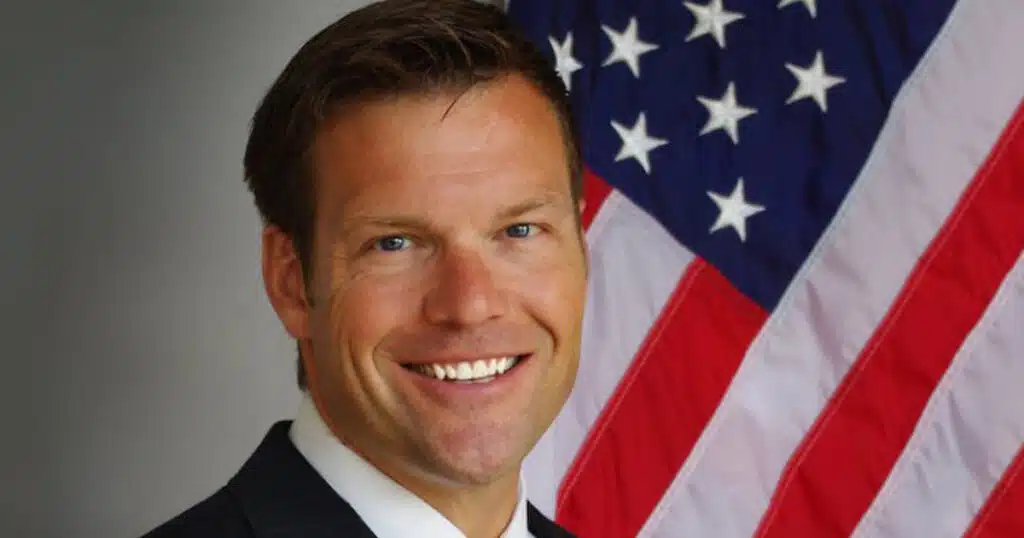
Kris Kobach: Biden-Harris Admin Has ‘Thumb on the Scales’ in Electioneering Order
Known action by the Biden-Harris administration, combined with secrecy, “creates an impression” that the federal government has its “thumb on the scales” for the Nov. 5 presidential election, Kansas Attorney General Kris Kobach says.
Kobach, a Republican, is leading a multistate lawsuit to strike down President Joe Biden’s 2021 executive order on elections.
“It appears it could be designed to register more Democrats than Republicans,” Kobach said of Biden’s order in a phone interview Wednesday with The Daily Signal.
The Kansas attorney general referred to a March letter, cited in footnotes in the lawsuit, from Senate Judiciary Chairman Dick Durbin of Illinois and other Senate Democrats to U.S. Attorney General Merrick Garland about voter registration through the Federal Bureau of Prisons.
“Durbin’s letter is applauding registration in prisons, and prisoners have disproportionately been Democrats,” Kobach told The Daily Signal.
Kobach and eight other state attorneys general filed the lawsuit Tuesday in the U.S. District Court for the District of Kansas, calling for Biden’s Executive Order 14019—which he signed in March 2021—to be struck down as unconstitutional and unlawful.
The lawsuit asks the court to enjoin all federal agencies from implementing Biden’s order for them to help increase voter registration and turnout.
“President Biden has sought to convert the federal bureaucracy into a voter registration organization and to turn every interaction between a federal bureaucrat and a member of the public into a voter registration pitch,” the suit says. “That exceeds any authority executive entities have under federal law, violates the Constitution, threatens states’ attempt to regulate voter registration, and thus ultimately undermines the voter registration systems set up by the states.”
The Biden-Harris administration has argued that the order—which also calls for agencies to partner with private organizations—promotes voting rights.
Critics refer to the order as “Bidenbucks” because it puts taxpayer-funded resources behind turning out likely Democratic constituencies.
The other Republican attorneys general in the case are Austin Knudsen of Montana; Brenna Bird of Iowa; Marty J. Jackley of South Dakota; Lynn Fitch of Mississippi; Michael T. Hilgers of Nebraska; Drew Wrigley of North Dakota; Gentner Drummond of Oklahoma; and Alan Wilson of South Carolina.
Biden and his Cabinet members are named as defendants. Vice President Kamala Harris, Democrats’ impending nominee for president, is not.
“This is very late in the game, but better late than never,” lawyer Cleta Mitchell, who chairs the Election Integrity Network, told The Daily Signal. “Anything that can be done to stop this use and misuse of taxpayer resources for partisan political activity needs to be done.”
Mitchell, a former member of the Oklahoma House of Representatives from Oklahoma, said she is glad her state is one of the plaintiffs.
The reason the lawsuit was filed more than three years after Biden signed the executive order is in part due to the secrecy surrounding it, Kobach told The Daily Signal.
“Part of the reason is we didn’t know what the impact would be,” Kobach said. “If the administration had done this under the Administrative Procedures Act, there would have been public notice and comment. They just proceed ahead.”
The Kansas attorney general added: “It would be interesting to know how many people were registered [to vote] through federal agencies, and if specific states were targeted.”
The litigation by the nine state attorneys general expresses frustration over the secrecy.
“Rather, all an agency does is submit the plan to the White House; nothing else is necessary for the plan to be effective,” the complaint says at one point. “Further, in response to requests under the Freedom of Information Act, the Biden-Harris administration has asserted that the plans are subject to privilege and may be withheld from public scrutiny.”
The lawsuit specifically makes an argument tied to the separation of powers in government under the U.S. Constitution.
“Agencies cannot take money Congress allocated and reuse it for improper purposes. And they certainly cannot do so without following the laws that establish procedures laid out by Congress,” the complaint says.
It later says: “There was no legal authority for President Biden to issue the EO [executive order]. No provision of the Constitution grants him such power. Neither does the NVRA or any other federal statute grant him such power.”
The acronym NVRA refers to the National Voter Registration Act.
This is at least the third lawsuit against Biden’s executive order on voting. A group of Pennsylvania state legislators, all Republicans, filed a lawsuit in March. The America First Policy Institute, founded by veterans of the Trump-Pence administration, led a lawsuit targeting the order in July.
Separately, the House Administration Committee, which oversees elections, subpoenaed 15 Cabinet members to explain to Congress how Biden’s order is being implemented.
The litigation by the nine state attorneys general uses Durbin’s letter to Garland about voting information for federal prisoners as an example of agencies implementing the president’s order without following any of the procedures laid out by Congress.
“For example, the U.S. attorney general is registering imprisoned felons to vote—but there was never notice nor comment on that policy to allow the public to weigh in on whether that is right,” the lawsuit says. “And in many states, felons voting is illegal. Because the U.S. attorney general failed to follow neutral processes the likelihood of potential conflicts between federal action and state laws is heightened.”
The lawsuit also notes that federal services, such as farm loans and government benefits, are instructed to engage in voter registration under the order. Plaintiffs note this could give the wrong idea to beneficiaries.
“They failed to consider the fact that linking voter-registration activities or material to federal benefits would pressure recipients of those benefits to either participate in those activities or register to vote,” the lawsuit says.
Neither the White House nor the Justice Department—which would defend the Biden-Harris administration’s policy—responded to The Daily Signal’s inquiries on the litigation.
However, last week, White House press secretary Karine Jean-Pierre responded to a reporter’s question related to the executive order.
“I think that is something that not just, obviously, the vice president and the president have spoken to since almost Day One—Day One of their administration, when the president signed an executive order, to do everything that we can from the federal level to make sure that voting is more accessible—is more easily accessible to Americans across the country,” Jean Pierre said during the Aug. 6 press briefing.
“And that is something that the president understands and continues to do everything that we can to make that happen,” she said.
Last month, during remarks to the NAACP’s national convention, Biden said his executive order on turning out the vote was all that he could do constitutionally. However, he urged Congress to pass new measures to expand voting.
“Kamala and I are calling on Congress to pass the John Lewis Voting Rights Act,” Biden told the audience. “I did all that I was constitutionally able to do with executive authority, but we need the act. And we need to pass the Freedom to Vote Act. And I will sign them both into law immediately.”



